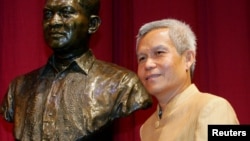The government of Laos is denying responsibility for the disappearance of a prominent social activist, but human rights groups disagree, saying security camera footage suggests he was detained by Lao authorities.
Sombath Somphone was last seen Saturday in the capital, Vientiane, when his jeep was stopped by authorities outside a police post. Video footage posted on YouTube appears to show him being taken away with two unidentified men.
Four days after his disappearance, the Lao Foreign Affairs Ministry released a statement saying it has no information about Sombath's whereabouts. It suggested the 60-year-old activist may have been kidnapped for "personal" or "business" reasons.
Many of his friends and fellow activists remain unconvinced. Sunai Phasuk, a senior researcher at Human Rights Watch, said in an interview with VOA that the government's statement does not match up with the evidence.
"At this point, based on all the accounts of his family, as well as circumstantial evidence, including the security camera footage, we believe that Lao authorities are responsible for the disappearance of Sombath and he might still be in custody somewhere," he said.
Sunai points out that Laos, a single-party communist state that does not tolerate dissent, has a long record of carrying out arbitrary arrests and enforced disappearances.
"The authorities in Laos claim they have transformed into a 'new Laos' on par with the rest of the countries in Southeast Asia in terms of respect for the due process of law and justice," Sunai said. "But what happened to Sombath is a spine-chilling reminder this is still the same old Laos where the state can still use this power arbitrarily in violation of human rights and doesn't care much about accountability."
Sunai said, if Sombath was abducted, as the government claims, it should provide information on why no police at the checkpoint failed to stop the assailants from taking him away.
A group of 132 Asian intellectuals wrote a letter Thursday to Lao officials, urging a thorough government investigation into their colleague's disappearance. The U.S. State Department has also called for the Lao government to make every effort to locate the activist.
In 2005, Sombath received the Ramon Magsaysay Award for Community Leadership, widely regarded as Asia's Nobel Peace Prize, for his efforts to promote sustainable development.
His friends say that Sombath's work was not directly political or confrontational, and that he was not known to have any enemies.
Sombath Somphone was last seen Saturday in the capital, Vientiane, when his jeep was stopped by authorities outside a police post. Video footage posted on YouTube appears to show him being taken away with two unidentified men.
Four days after his disappearance, the Lao Foreign Affairs Ministry released a statement saying it has no information about Sombath's whereabouts. It suggested the 60-year-old activist may have been kidnapped for "personal" or "business" reasons.
Many of his friends and fellow activists remain unconvinced. Sunai Phasuk, a senior researcher at Human Rights Watch, said in an interview with VOA that the government's statement does not match up with the evidence.
"At this point, based on all the accounts of his family, as well as circumstantial evidence, including the security camera footage, we believe that Lao authorities are responsible for the disappearance of Sombath and he might still be in custody somewhere," he said.
Sunai points out that Laos, a single-party communist state that does not tolerate dissent, has a long record of carrying out arbitrary arrests and enforced disappearances.
"The authorities in Laos claim they have transformed into a 'new Laos' on par with the rest of the countries in Southeast Asia in terms of respect for the due process of law and justice," Sunai said. "But what happened to Sombath is a spine-chilling reminder this is still the same old Laos where the state can still use this power arbitrarily in violation of human rights and doesn't care much about accountability."
Sunai said, if Sombath was abducted, as the government claims, it should provide information on why no police at the checkpoint failed to stop the assailants from taking him away.
A group of 132 Asian intellectuals wrote a letter Thursday to Lao officials, urging a thorough government investigation into their colleague's disappearance. The U.S. State Department has also called for the Lao government to make every effort to locate the activist.
In 2005, Sombath received the Ramon Magsaysay Award for Community Leadership, widely regarded as Asia's Nobel Peace Prize, for his efforts to promote sustainable development.
His friends say that Sombath's work was not directly political or confrontational, and that he was not known to have any enemies.





